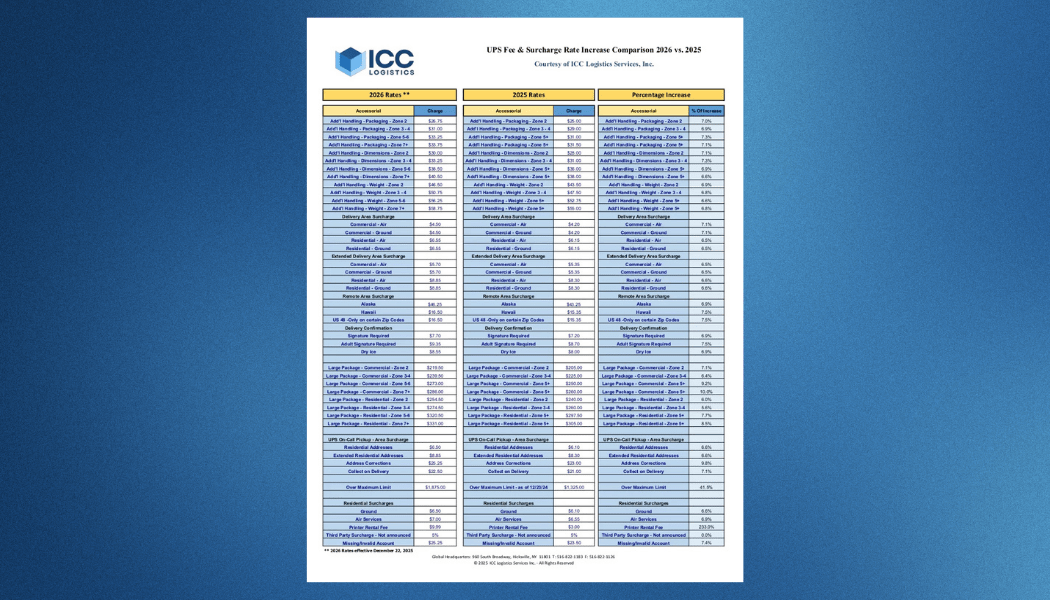Carrier proposals often look attractive, full of discounts, incentives, and carefully packaged rates. But here’s the challenge: unless you compare those offers against unbiased market data, you’ll never know if they’re actually competitive. That lack of visibility means many companies end up paying 15–30% more than peers with virtually identical shipping profiles. By leveraging benchmarking, organizations can transform carrier negotiations from reactive guesswork into proactive, data-driven strategies that truly control transportation spend.
This article explains how logistics contract benchmarking works, why companies with similar shipping needs often pay drastically different prices, and how ICC Logistics equips shippers with the leverage necessary to protect margins and negotiate from strength.
Why Logistics Contract Benchmarking Matters
Unlike retail shelf prices, carrier contracts are private, confidential, and highly customized. Two companies moving close to the same shipment volumes, weights, and zones may see dramatically different costs. In fact, one company might unknowingly overpay thousands per month simply because they negotiated in isolation without data-backed comparisons.
Carriers rarely reveal how their rates stack up against others in your industry, leaving most shippers to negotiate effectively in the dark. This lack of transparency benefits carriers, not customers. Benchmarking closes that information gap by evaluating your contract against large pools of anonymized market intelligence spanning industries, geographies, parcel, LTL, FTL, and international shipping lanes.
Beyond serving as a “pricing reality check,” benchmarking also surfaces hidden cost drivers. These include avoidable surcharges, underutilized incentives, and clauses that create long-term risk. Equipped with these insights, supply chain leaders enter negotiations grounded in verifiable facts rather than carrier promises.
How Data Creates Real Negotiation Leverage
Benchmarking doesn’t just identify problems — it provides a proof-based foundation for negotiation. With a blend of 50 years of historical rate intelligence layered against real-time data comparisons, ICC Logistics arms clients to challenge carriers with hard evidence.
Instead of relying on vague “discounts” or assurances, shippers arrive at the table with clear benchmarks on what comparable businesses are actually paying today. This transforms negotiation dynamics. Carriers quickly recognize they’re dealing with informed buyers, forcing a more honest discussion and increasing pressure to provide competitive terms.
Clients using data-driven negotiations commonly achieve outcomes like:
- Identifying overcharges and contract misalignments before renewals locks in higher costs
- Reducing margin erosion caused by growing surcharges, such as fuel or residential delivery fees
- Pinpointing where incentives and earned discounts fall short of market averages
- Rebalancing shipping mode mix—for instance, shifting specific services from Express to Ground to reduce expense
Why Do Similar Companies Pay Different Freight Rates?
The reasons boil down to timing, leverage, and information. A contract secured during a market peak—without benchmarking support might trap a company in rates that are 20–30% higher than what competitors secured earlier or later. Similarly, companies that negotiate without a clear sense of what’s “fair” in the market often agree to excessive accessorials, weaker incentive structures, and vague terms that drive long-term cost escalation.
In contrast, companies empowered with benchmarking data can push back confidently, securing tiered discounts that match their shipment profile, minimizing unnecessary surcharges, and ensuring clauses remain advantageous. The difference in these outcomes directly illustrates why benchmarking has become not just valuable but essential for cost control.
Key Use Cases for Logistics Contract Benchmarking
While most recognize its role in carrier negotiations, benchmarking provides broader benefits across the supply chain. Some of the most impactful applications include:
- Annual contract renewals – Ensuring carriers’ proposals remain competitive relative to current market standards.
- Responding to cost spikes – Validating whether sudden increases stem from justified fuel adjustments or from negotiable margin padding.
- Carrier diversification planning – Providing clarity on when it makes sense to split volumes across FedEx, UPS, regional carriers, or LTL providers.
- Supporting finance and leadership teams – Supplying hard evidence during budget-setting or when justifying transportation cost initiatives within an organization.
Without benchmarking, shippers must react after costs rise. With it, companies move into a proactive, data-led posture where every decision — from contracting to budgeting — stands on defensible ground.
How ICC Logistics Delivers Insight and Leverage
ICC Logistics combines freight auditing, benchmarking intelligence, and contract negotiation expertise into one end-to-end solution. This integrated approach means clients don’t simply receive after-the-fact audit recoveries—they also gain the market intelligence needed to prevent costs from ballooning again in the future.
For more than five decades, ICC has helped shippers across parcel, less-than-truckload, full truckload, and ocean freight achieve sustainable improvements in spend and efficiency. Specific benefits include:
- Reducing and continuously monitoring transportation spend
- Providing transparency into complex and opaque carrier agreements
- Enhancing operational efficiency through smarter carrier management
- Preventing “silent margin creep” from unnoticed rate shifts and billing practices
With ICC, organizations gain not only reliable transportation cost savings but also confidence that their logistics strategies are positioned to withstand fluctuating markets and aggressive carrier tactics.
Frequently Asked Questions
What is logistics benchmarking, and why does it matter?
Logistics benchmarking compares your carrier contracts—including base rates, surcharges, and accessorials—against anonymized market data. Because carriers rarely disclose how your rates compare with peers, benchmarking is the only way to validate whether you are overpaying relative to similar shippers.
How does benchmarking help with carrier negotiations?
It adds objectivity and leverage. Instead of relying on a carrier’s narrative, you bring verifiable benchmarks to the negotiation table. This real-world data allows you to correct misaligned terms and push for savings with greater confidence.
Why do similar companies pay different freight rates?
Contracts are intentionally opaque, customized, and confidential. Outcomes often hinge on the timing of the agreement, the negotiating strategy, and the availability of benchmarking intelligence. Companies without benchmarking data compromise leverage, resulting in higher costs.
How can I use data to negotiate better shipping contracts?
By pairing the results of freight audits with external benchmarking datasets, shippers can identify overcharges, establish achievable cost targets, and rebuild contracts to unlock rebates, incentives, and optimized shipping mix strategies.
Strategic Next Steps for Supply Chain Leaders
If your organization is approaching a carrier contract renewal—or if freight costs have been steadily climbing—now is the time to adopt contract benchmarking. Each percentage point saved on transportation spend flows directly to the bottom line, meaning negotiations guided by data can significantly improve margins.
With ICC Logistics as a partner, supply chain executives transform contract discussions from reactive cost adjustments into strategic cost-control measures. Instead of waiting to see how costs rise, you establish proactive protections that deliver lasting financial resilience and operational predictability.
For further strategies and deeper insights, explore these ICC Logistics resources:
- Parcel Auditing vs Freight Auditing: What’s the Difference?
- Understanding Surcharge Recovery and Hidden Fees in Shipping
- Stay Ahead of the Latest UPS & FedEx Rate Hikes
- The Invoice Trap: Why Freight Invoice Errors Happen
- Why FedEx’s New DIM Weight Policy Could Hurt High-Volume Shippers
Final Thought
Carrier proposals can appear attractive, but unless they’re measured against meaningful benchmarks, fairness remains uncertain. By combining decades of expertise with deep data analysis, ICC Logistics turns benchmarking into a powerful tool that shifts negotiations from uncertainty to clarity, moving shippers beyond guesswork and firmly into leverage-based control.



 to receive our FREE white papers:
to receive our FREE white papers: